The Complete Guide to Dog Care: How to Keep Your Dog Happy, Healthy, and Active
The truth is that dog care is not just a responsibility, but a deep bond of love and trust. Dogs are naturally loyal and sensitive, and they are happiest in an environment where love is accompanied by discipline. By following this guide based on a high-quality diet, regular exercise, timely medical care and positive training,…
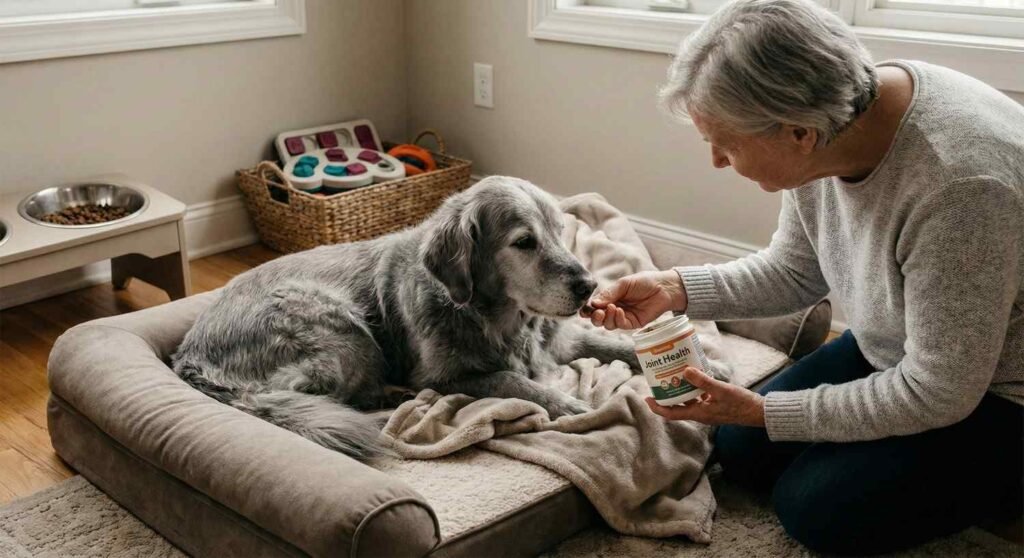
The truth is that dog care is not just a responsibility, but a deep bond of love and trust. Dogs are naturally loyal and sensitive, and they are happiest in an environment where love is accompanied by discipline.
By following this guide based on a high-quality diet, regular exercise, timely medical care and positive training, you can ensure that your silent companion does not just survive, but lives a full life. The more time and attention you spend on your dog’s well-being today, the more selfless love and happiness they will return to you for years to come.
Spend time with them daily, treat them with kindness and speak to them in a gentle tone. Your dog does not need a palace to live in; they just need a responsible and loving guide to support them on their journey through life.
1. Precision Nutrition: Building the Foundation of Longevity
Your dog’s long and healthy life depends largely on his diet. A balanced diet not only provides him with energy, but it also strengthens his immune system, keeps his organs healthy, and makes his coat shiny.
Choosing High-Quality Food
When buying dog food, it’s important to remember the “first five” rule, because the first five ingredients on the package determine the actual nutrition. Always choose a food that includes these things:
- Real protein: The first should be pure chicken, beef, or lamb, not just bones or offal.
- Healthy fats: The omega-3 and omega-6 fats found in fish oil or flaxseeds keep their brain sharp and their skin glowing.
- Best carbohydrates: Sweet potatoes or brown rice are better than cheaper alternatives like corn or soybeans, as they keep your dog energized for longer.
The Dangers of Human Food
Dogs have a completely different metabolism than humans. Many things that are healthy for us can be deadly for them. Avoid these in particular:
- Xylitol: This is an artificial sweetener found in chewing gum and some peanut butters that can quickly damage a dog’s liver.
- Grapes and raisins: These can cause sudden kidney failure in dogs.
- Cooked bones: Unlike raw bones, cooked bones dry out and become weak and can break into sharp pieces when chewed, which can injure or puncture a dog’s intestines.
Feeding Schedules and Hydration
Establish a regular feeding schedule for your pet to help them stay healthy. Small puppies should be fed three to four times a day in small portions to maintain their energy levels, while larger dogs do best on two meals a day. Always provide them with clean, filtered water and wash their water bowls thoroughly every day to prevent the build-up of bacteria that can negatively impact their digestive system.
2. Strategic Exercise and Mental Enrichment
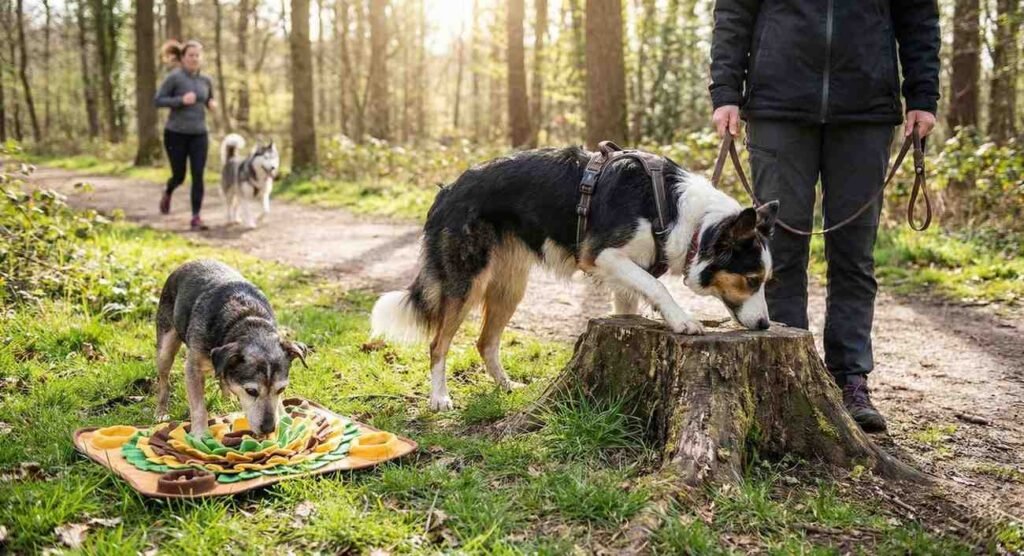
Physical health is only half the battle; mental health is equally vital. Destructive behaviors like chewing furniture or excessive barking are usually cries for mental stimulation.
Tailored Physical Activity
Exercise according to the physical needs of dogs:
High-energy dogs: They need one to two hours of vigorous exercise, running or keeping them busy with something every day.
Dogs with small mouths: These dogs may have difficulty breathing, so only take them for short, light walks.
Sniffing: Let your dog find his way with his nose during the walk (i.e. let him sniff things). Sniffing things tires the dog’s mind and gives him a lot of peace and joy.
Mental Gymnastics
Invest in puzzle feeders or “snuffle mats.” Forcing a dog to “hunt” for their kibble engages their natural instincts and prevents the cognitive decline often seen in senior dogs.
3. The Art of Grooming: More Than Just Aesthetics
Grooming is your primary opportunity to perform a “home physical” on your dog. Regular sessions allow you to spot lumps, ticks, or skin irritations before they become major medical issues.
Coat Care and Skin Health
Here are some things you can do to protect your dog’s skin and coat:
Brushing: Even short-haired dogs should be brushed once a week, as this spreads the natural oils from their skin over their entire body and removes dead hair.
Bathing: Bathing your dog too often strips them of their natural oils, which can lead to itching or skin disease. If your dog is not very dirty, bathing them every 4 to 6 weeks with a special dog shampoo is sufficient.
The Forgotten Essentials: Ears, Nails, and Teeth
Essentials we often forget: Ears, Nails, and Teeth
- Dental Cleaning: Dental disease is the most common problem in dogs. Brush their teeth at least three times a week with a special dog toothpaste.
- Nail Care: If you hear your dog’s nails ‘clicking’ on the floor while walking, it’s a sign that they’ve grown too long. Long nails can cause the bones in the paws to bend, which can lead to joint pain.
- Ear Inspection: Check the inside of the ears once a week; if they’re red or smelly, it could be a sign of infection. Be especially careful with dogs with long, floppy ears (like Labradors).
4. Preventative Veterinary Care: The Proactive Approach
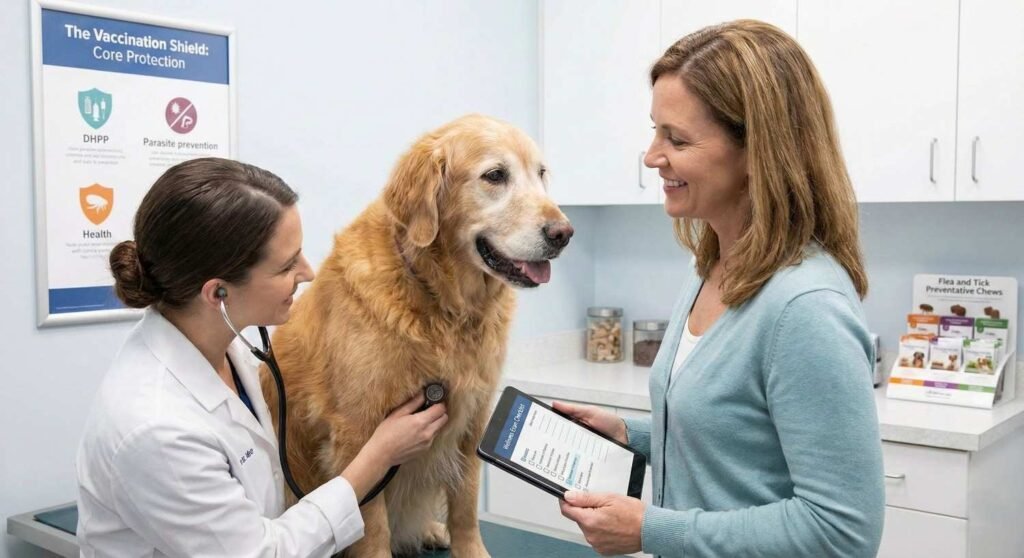
Modern veterinary medicine focuses on prevention rather than just treatment. Being a responsible owner means staying ahead of potential illnesses.
Annual Wellness Exams
A veterinarian can easily detect abnormal heart rhythms or internal problems that an average owner might not notice. It is especially good for older dogs (over 7 years old) to have their kidneys and liver checked twice a year through blood tests to monitor their functioning.
The Vaccination Shield
These vaccines and medications are essential for a healthy pet:
- Basic vaccines: Rabies vaccination is legally required and is a life-threatening disease. In addition, the DHPP vaccine protects dogs from four major and dangerous diseases.
- Flea and heartworm prevention: Heartworms, fleas, and ticks are not only annoying, but they also spread dangerous diseases. Monthly vaccinations are essential for the complete protection of your pet.
5. Training, Socialization, and Emotional Well-being
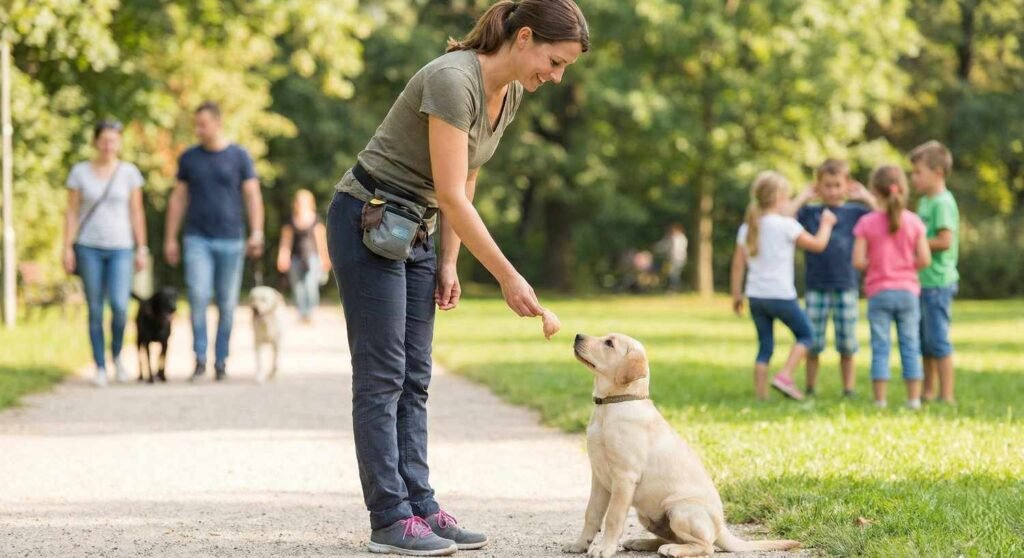
A trained dog is essentially an independent dog. When a dog obeys commands like “stay” or “come,” it has safer opportunities to roam around without a leash and meet other people outside.
The Power of Positive Reinforcement
Give up the old ways of bullying your dogs because according to modern science, dogs learn best when they are rewarded. To instill good habits, give them tasty treats like boiled chicken and avoid punishment altogether, as this can make the dog fearful and aggressive, which is very difficult to correct.
Early Socialization
Socialization of puppies
The period from 3 to 16 weeks of age is very important for puppies. During this time, it is important to expose them to new things:
Different sounds: such as vacuum cleaners, car horns or sirens.
Different places: such as walking on grass, gravel or unpaved roads.
Different people: introducing them to children, people carrying umbrellas or people wearing hats.
Benefits: A puppy that has been well trained in childhood grows up to be confident and is not afraid or nervous when seeing unfamiliar things or situations.
Managing Separation Anxiety
Dogs are social animals and can feel lonely or abandoned when you leave them. To solve this problem:
- Keep your routine: Don’t make a big deal out of it when you leave or come back home.
- Leave your scent: Place a worn-out piece of clothing (like an old T-shirt) in their bed. Your scent will help them relax.
- Calm environment: Use “white noise” (like a fan running continuously) or soothing “diffusers” to keep the atmosphere at home calm.
6. Safety and Environmental Management
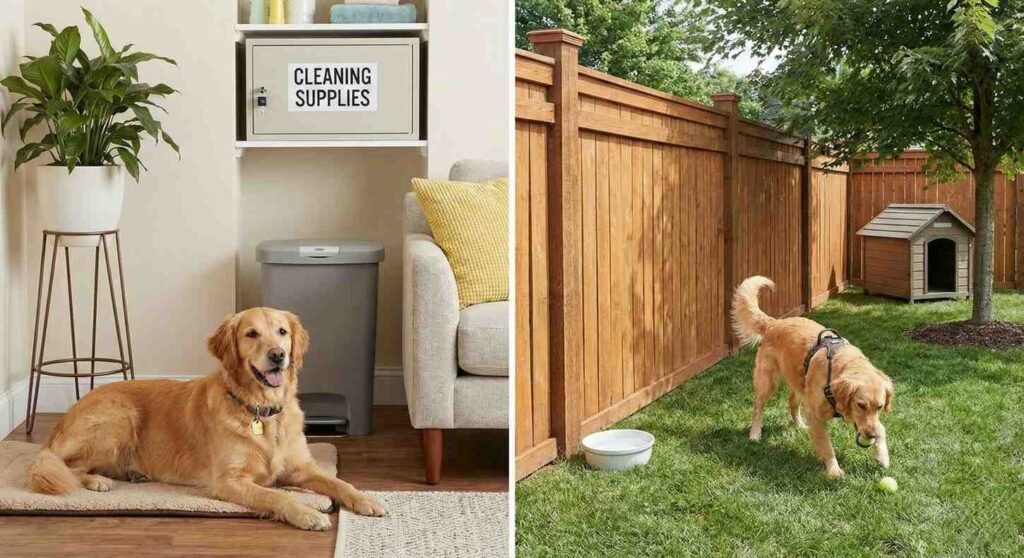
Your home should be a peaceful haven for your pet. “Dog-proofing” your home is an ongoing process.
1. Indoor Safety
- Trash Cans: Keep trash cans tightly closed so your dog can’t chew on them (to prevent “garbage gut”).
- Chemicals: Store household cleaning chemicals in high cabinets where your dog can’t reach them.
- Poisonous Plants: Many common plants, such as lilies and sago palms, are highly toxic to dogs.
2. Outdoor Safety
- Fence: A secure fence or perimeter around your home is essential.
- Don’t tie up: Never leave your dog tied up outside for long periods of time. This can cause aggression and physical harm to the dog due to the harsh weather.
3. Identification
- Microchip and Tag: Even the most well-trained dog can run away from something. Make sure that:
- Your dog is microchipped.
- He is wearing a collar with an ID tag and your latest contact number clearly written on it.
7. Caring for Your Senior Companion
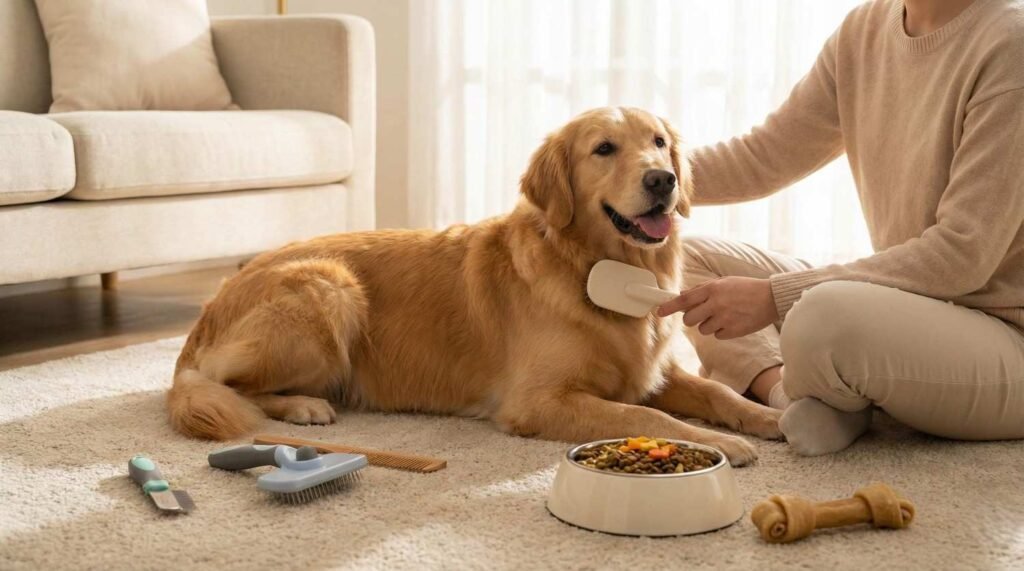
“As your dog ages, his needs change.
- Orthopedic Support: Provide a soft memory foam bed to help relieve and comfort aging joints.
- Dietary Changes: Older dogs often need fewer calories but more fiber. Add joint-strengthening supplements (such as Glucosamine and Chondroitin) to their diet.
- Cognitive Support: Keep their brain sharp and alert with gentle exercise and exposure to new scents.
| Category | Daily Action | Monthly/Yearly Action |
| Diet | Fresh water + Measured meals | Weigh-in to check for obesity |
| Physical | 30–60 mins of activity | Professional nail trim |
| Mental | 15 mins of “sniffing” or puzzles | New environment exposure |
| Health | Teeth brushing/wiping | Annual Vet Checkup + Titers |

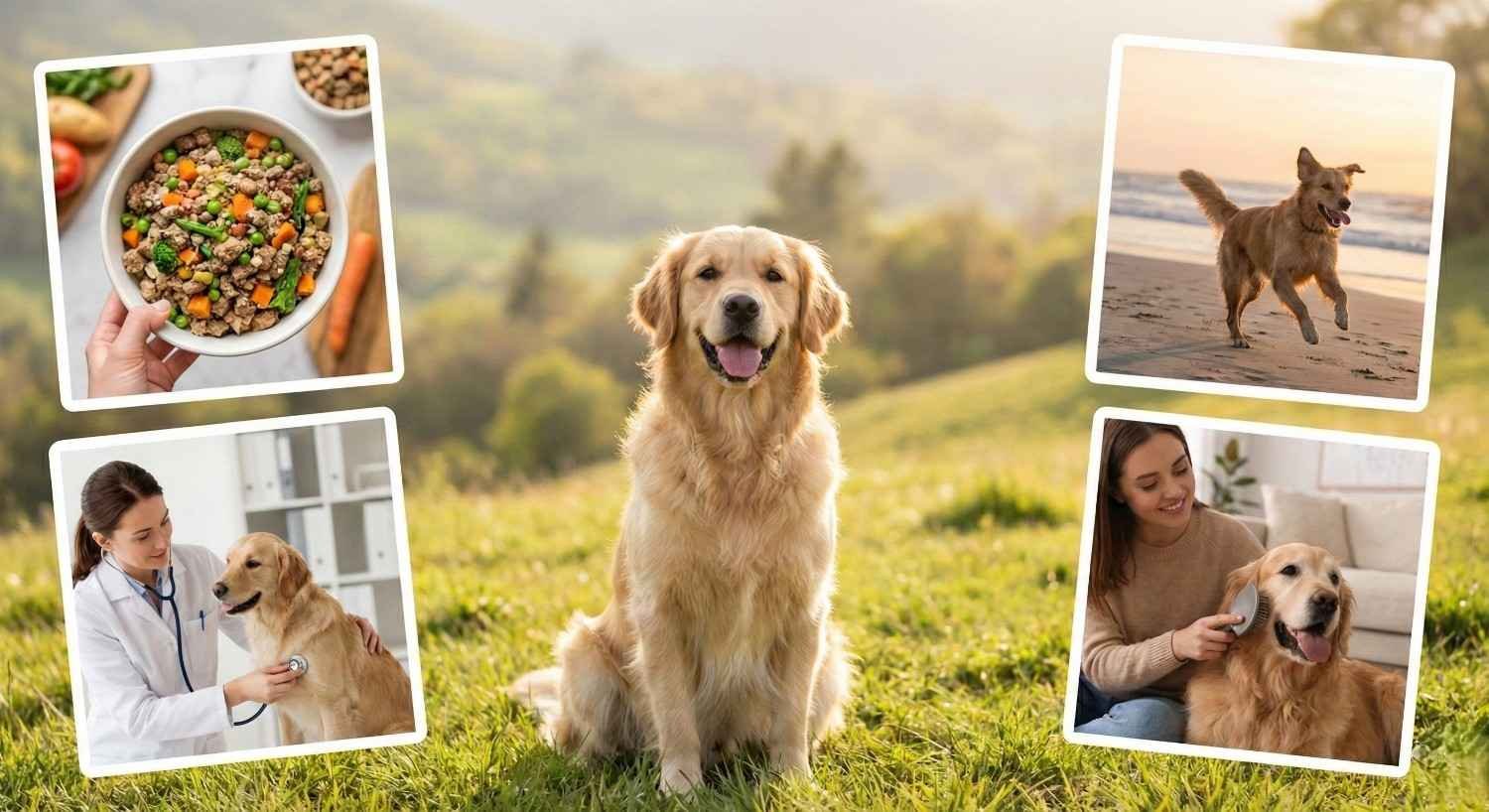


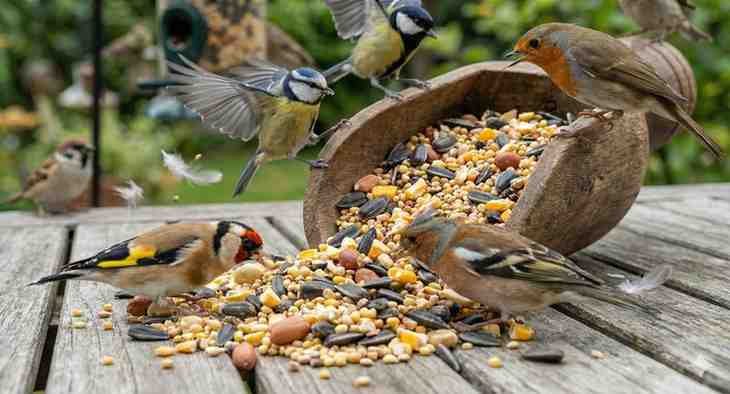



Alright, so I was checkin’ out neo88net the other day. Gotta say, I was pretty impressed! The site’s slick and easy to navigate. Honestly, I had a blast playing around on it. Check it out yourself! neo88net